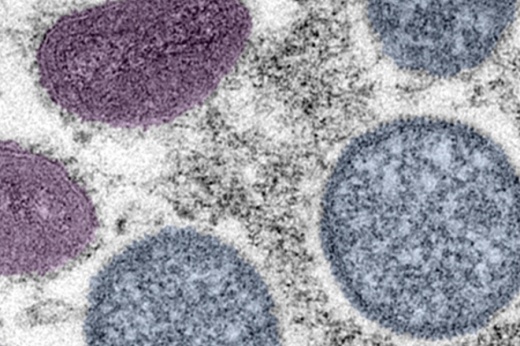The San Antonio Metropolitan Health District and Bexar County on July 14 confirmed two local cases of monkeypox and issued tips for keeping safe during the outbreak of the rare disease.
According to a news release, both individuals are currently isolating and following all recommended guidance, and all close contacts have been notified. As of July 13, Texas has 42 cases of monkeypox reported.
Currently, risk to the public remains low, Metro Health officials said, adding that individuals should be aware of the symptoms of monkeypox and seek medical attention if they experience new, unexplained rashes or skin lesions.
Recently identified cases have involved skin lesions in the genital, groin, and anal regions that might be confused with rashes caused by common diseases such as herpes and syphilis, the release said, adding that other early symptoms of monkeypox include fever, chills, and swollen lymph nodes.
Metro Health Director Claude Jacob said because the disease does not easily spread from person to person without direct contact, the chance of exposure to the public is minimal.
“We encourage residents to be aware of the symptoms, follow prevention recommendations and consult with a health care provider when needed,” Jacob said.
According to Metro Health, monkeypox can spread to anyone through skin-to-skin contact, especially direct contact with a rash, scabs or body fluids from a person with monkeypox.
Additionally, touching objects, fabrics, and surfaces that have been used by someone with monkeypox or close contact with respiratory secretions can transmit the disease, Metro Health said.
This contact can happen during oral, anal, and vaginal sex or while touching the genitals or anus of a person with monkeypox, the release said.
Metro Health is sharing the following safety tips with the public:
- Avoid close, skin-to-skin contact in large crowds where people are wearing minimal clothing, including nightclubs, festivals, raves, saunas and bathhouses.
- Avoid close, skin-to-skin contact with someone with a new, unexplained rash.
- If exposed to monkeypox or have symptoms such as fever; chills; swollen lymph nodes; and a new, unexplained rash, contact your health care provider as soon as possible. Health care providers can provide testing and care for people with monkeypox.
- *If sick with monkeypox, isolate at home until the rash has fully resolved, the scabs have fallen off and a fresh layer of intact skin has formed. Monkeypox is usually a self-limiting infection that does not require hospitalization, the release said.
According to Metro Health, supplies of the monkeypox vaccine are currently limited locally. Vaccination is being offered only to people identified as contacts during Metro Health case investigations.





